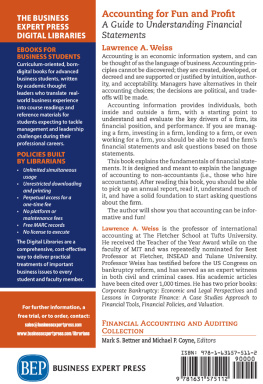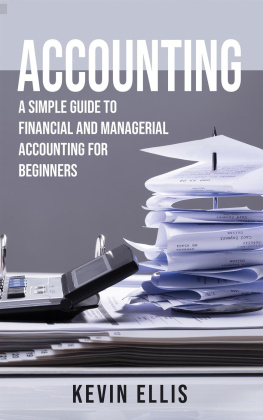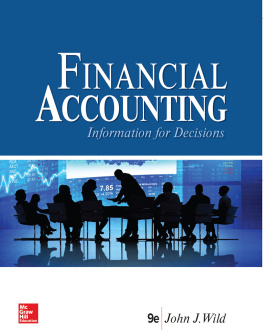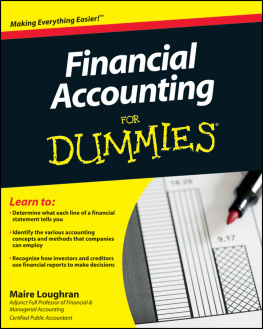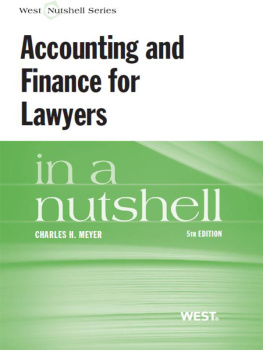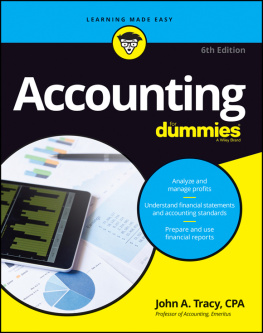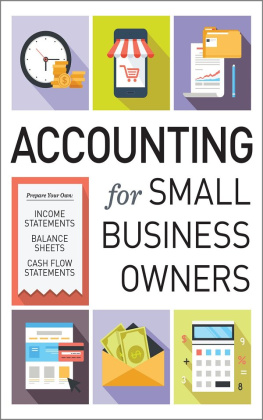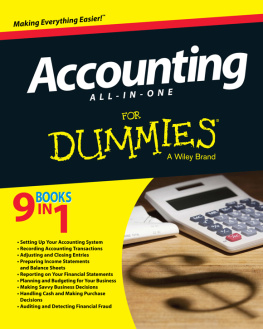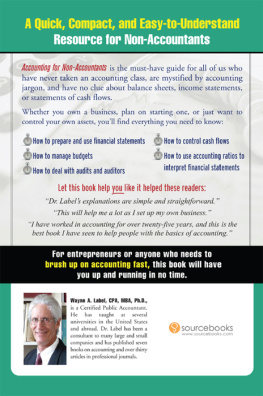Accounting for Fun and Profit
Accounting for Fun and Profit
A Guide to Understanding Financial Statements
Lawrence A. Weiss

Accounting For Fun and Profit: A Guide to Understanding Financial Statements
Copyright Lawrence A. Weiss, 2016
All rights reserved. No part of this publication may be reproduced, stored in a retrieval system, or transmitted in any form or by any meanselectronic, mechanical, photocopy, recording, or any other except for brief quotations, not to exceed 250 words, without the prior permission of the publisher
First published in 2016 by
Business Expert Press, LLC
222 East 46th Street, New York, NY 10017
www.businessexpertpress.com
ISBN-13: 978-1-63157-511-2 (paperback)
ISBN-13: 978-1-63157-512-9 (e-book)
Business Expert Press Financial Accounting and Auditing Collection
Collection ISSN: 2151-2795 (print)
Collection ISSN: 2151-2817 (electronic)
Cover and interior design by S4Carlisle Publishing Services Private Ltd., Chennai, India
First edition: 2016
10 9 8 7 6 5 4 3 2 1
Dedication
For Marilyn, Josh, and Dan
Abstract
Accounting is an economic information system, and can be thought of as the language of business. Accounting principles cannot be discovered; they are created, developed, or decreed and are supported or justified by intuition, authority, and acceptability. Managers have alternatives in their accounting choices; the decisions are political, and trade-offs will be made. Accounting information provides individuals, both inside and outside a firm, with a starting point to understand and evaluate the key drivers of a firm, its financial position, and performance. If you are managing a firm, investing in a firm, lending to a firm, or even working for a firm, you should be able to read the firms financial statements and ask questions based on those statements.This book explains the fundamentals of financial statements. It is designed and meant to explain the language of accounting to nonaccountants (i.e., those who hire accountants). After reading this book, you should be able to pick up an annual report, read it, understand much of it, and have a solid foundation to start asking questions about the firm. Hopefully, this book will show you that accounting can be fun and informative.
Keywords
Accounting, economic drivers of a firm, financial statements, financial analysis
Contents
I am grateful to Bridgette Hayes and Stephanie Landers, who corrected my many editorial mistakes and helped make my prose easier to read. I would also like to thank Michael Duh for helping to ensure the numbers are consistent.
A special thanks is also owed to Prof. Mark Bettner for his editorial comments as well as Scott Isenberg and the team at Business Expert Press.
Finally, I would like to thank my former teachers for setting me on my academic path and all my former students who have made my career such a pleasure.
If you were building a house, would you hire an architect, give her some money and say, Build me a house? If you did, the house might end up on the front cover of an architectural magazine, but it might not be a house you would want to live in. I suggest you might benefit from learning a bit about architecture before building a house so that you could work with the architect to build the house you want to live in. Similarly, if a surgeon (who is paid to cut people open, who enjoys cutting people open, and who honestly believes she can best cure people by cutting them open) suggests an operation, you would be smart to learn about your illness and get a second opinion before having the surgery.
Accounting is no different, and it is much too important to be left to the accountants. If there is one message you should take away from this book, it is NEVER TRUST AN ACCOUNTANT! This may seem a bit harsh, but why would you trust an accountant any more than an architect, doctor, or other professional? A healthy dose of skepticism is a good thing. Any time you hire a professional, it is best to have a basic understanding of what the professional does so you can tell the professional what you want them to do. If you have a medical condition that might require surgery, know enough about your condition to determine whether surgery is the right course of action and, if it is, to find the best surgeon for you (not a good idea to try doing surgery on yourself!). Likewise, if you are managing a firm, investing in a firm, lending to a firm, or even working for a firm, you should be able to read the firms financial statements and ask questions based on those statements.
This book explains the fundamentals of financial statements. Many accountants would benefit from reading this book as it may help them better understand why they are doing what they do, and improve their ability to explain accounting to others. However, the book is not designed for accountants. It is designed and meant for those who use and provide accounting information (i.e., those who hire accountants).
The book takes the perspective of a user of financial information and therefore limits its coverage of some of the technical aspects (some of the details can be left for the professionals). This means that many of this books topics are aimed at understanding what an accountant means when she uses certain terms and what the limits to accounting are. Some parts of the book are still a bit technical, but they are included because learning the basics of accounting is like learning vocabulary and grammar in a language. After all, accounting is a type of language: it is the language of business.
After reading this book, you should be able to pick up an annual report, read it, understand much of it, and have a solid foundation to start asking questions about the firm. Moreover, if there is something you do not understand, seek out an accountant and ask. There are accountants in all organizations and they generally welcome questions. If the accountant cannot answer your question, it means one of two things: One, there is a problem in the financial statements if the firm is presenting material in a manner that even an accountant cannot understand. Two, it means you need to find another accountant (as with all professionals, some are better than others).
Hopefully this book will show you that accounting can be fun and informative, or at least that it is not as painful as you may fear.
Accounting is about communication. It is an economic information system and can be thought of as the language of business. Accounting standards are as much a product of political action as they are of careful logic or empirical findings. Accounting principles cannot be discovered; they are created, developed, or decreed and are supported or justified by intuition, authority, and acceptability. This is important to note, as accounting rules may or may not have any inherent logic to them. We have alternatives in our accounting choices; the decisions are political and trade-offs will be made. However, if a user of accounting information understands the economic consequences of each choice, she can base her own accounting choices on her desired outcome and also interpret the decisions made by others.
Accounting information provides individuals, both inside and outside a firm, with a starting point to understand and evaluate the key drivers of a firm, its financial position and performance. This information can then be used to enhance decisions as well as help predict a firms future cash flows. The present current value of those cash flows provides an estimate for the value of the firm. Accounting systems and information are also required for business and legal reasons. It is therefore essential for managers, investors, and others to be aware of the signals given and received by the business community through financial reports.

